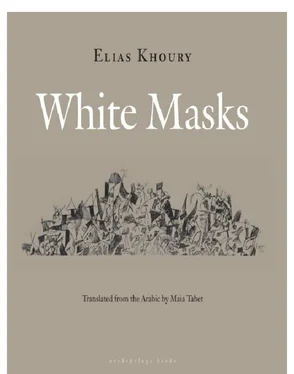“Hey, you!” he hears them shouting as they shake him by the shoulders. “You crazy or what?. . running like that into the middle of the street. . we told you there was a sniper. .”
They prop him up, and, still dazed, Mahmud gets to his feet. The dank smell pervades his nostrils, and even his pores.
“I… don’t. . I. . didn’t. .”
“Don’t ever do that again. We’ll let you off this time. Next time we’ll kick you out of here.”
“OK, OK.”
He wants to ask them what they have done with the handsome blond youth; he wants to ask if they need his help. . I could make tea and coffee for everyone, this little place of mine is already practically a youth club… they come here, they have something to drink, and they never pay. Far be it for me to accept payment or anything. . please come in, do come in. . make yourselves at home. . But why are the buildings burning?
And as the buildings burned, the watchman stood in front of his building and watched the gunmen cart away everything they could find: fridges, TVs, sofas. . anything they could lay their hands on. They said he could go up too but he was scared; eventually, he did go up to the top floor and, when he saw them rifling through drawers, he did the same, and when he saw them take every last thing, he too took things. Then he started going upstairs by himself; he’d take stuff he could sell; and he even bought stuff. Whenever he heard the sound of gunfire in the distance, or saw the fires breaking out, he’d smile and bide his time for the gunmen to leave. And leave they did — all of them left. Now, the street is deserted, there’s no more fighting in Kantari, and the war has moved on — downtown. That’s what they told him. All that’s left is a deserted street, faraway noises, and me by myself, thinks Mahmud Fakhro, standing all alone in the middle of a street, bereft of life. Just me, the stray cats and dogs, and the smell. . Not a human being in sight. . just a street.
He stayed on in the deserted neighborhood, watching his building, and when Khawaja Fadee called, he reassured him. Things are fine, he told him, but everything has been looted. At that, Fadee’s tone changed. He said he would be coming back, but it turned out that he didn’t dare.
“And so here I am, all by myself, and the street is all alone too.”
Fatimah said he’d changed.
She was always waiting for him in the new building. She’d be washing down the stairs and waiting, or helping Sitt Elham with the housework and waiting — but he never came by! And when he did, he was always in a hurry! He’d give her a few lira and then sit on a chair in front of the building and smoke a cigarette.
And while Fatimah wondered why he didn’t sleep with her, she didn’t dare ask him. The fact is that he didn’t. Never mind, she’d say, no matter, anyway that old shiver was long gone, even that discomfort she used to feel in the early days had disappeared. Still, Fatimah would wonder why he didn’t come near her whenever he slept at home. Where was the Mahmud who lived only for the nights, so he could throw himself on her? It used to be that nothing could deter him, she’d whisper in his ear, “The children will hear us,” but he wouldn’t listen, and just like that, he’d climb on top of her, thrusting and groaning, and she’d close her eyes and worry about the children hearing.
But now he slept with his back turned to her and snored loudly. She didn’t dare question him. She told him — no she begged him — not to go back there when he told her how dangerous it had become, how the Armenian doctor came by every day to check on his apartment without ever actually going up there, just stood hovering in the distance, and how the young men were always bouncing around with their guns and their boisterous talk and news of their martyrs.
Fatimah looks at him, incredulous, and feels frightened as she remembers him with the hood over his head being led off somewhere far away. She didn’t see the hood — she was upstairs in Mr. Mitri’s house when they kidnapped him. But now, whenever Mahmud appears in the distance, she pictures him with a brown bag over his head, his navy trousers rolled up, his calves thick with black hairs, his feet in plastic slippers, wearing that blue shirt of his, and them leading him away. But then, as she rushes out to meet him with the children, the brown sack recedes, and all that’s left are his chipped and yellowed front teeth. Hussein isn’t with them. Mahmud asks where the boy is, as he gathers up the youngest girl into his muscular arms and throws her up in the air; then he settles into a chair to have his tea and a cigarette, hands her some money and tells her about Fadee’s phone calls.
“The boy keeps calling… what can I say to him? Shall I tell him that they looted the building?”
“No, don’t. Poor thing, he’s so young still, and he’s got a heart of gold.”
Recounting her story, Fatimah remembers the hood, and Fadee’s face, how different he had looked in the car that time: with his bloodshot eyes, he resembled the gunmen who stood to attention as he drove them through Ashrafiyyeh, his hand raised in salute. He wasn’t Fadee anymore, she thought. Mahmud was sitting beside him in the front, his face in his hands, as though he didn’t want to look. . The children were crying. . And all the stuff we had to leave behind. .
Now Fatimah is washing down the stairs and waiting for Mahmud to come by. Hurtling down to the shelter for cover, the residents scream and tell her the place is filthy. Mahmud walks in and the landlord, Basheer al-Harati, starts wagging his finger menacingly at him, but when he sees the gun nestled against Mahmud’s right hip, his voice trails off and his finger sags.
“We’re all brothers,” the landlord says.
“Yeah, brothers,” Mahmud answers him.
“I know we’re all brothers, but my dear Abu Hussein. .”
“It’s Abu Ali, if you don’t mind.”
“OK brother, but Abu Ali, you’re not taking care of the building. . the garbage is piling up and you’re not doing a thing about it.”
“There’s a war on, Mr. Basheer, a war. . we all need to pull together. Put your trash into plastic bags and stop just tossing stuff down helter-skelter.
“Quite right.” And Basheer al-Harati struts off with his potbelly and his spectacles, leaving Mahmud standing there, muttering.
“Dogs! The rich are nothing but dogs! Every last one of them! Even Fadee’s a dog-a dog without a bark, a whimpering dog, but a dog all the same.”
Fatimah takes the black plastic bag Mahmud has used to shield himself from the rain.
“It’s raining a lot this year,” she says, throwing the bag away. And she goes into their room and bursts into tears. Mahmud can hear her. He follows her in, cursing.
“Women! Yes, they’re dogs too — the lot of them!”
He approaches her, laughing, then takes a seat on the floor; she sits down beside him. Fatimah tells him she wants to go back there, to the village. She tells him that the only thing she remembers is leaning over the edge of the stream and seeing the goat’s horns reflected in the water, and that she wants to go back and visit her mother’s grave.
“Come on, woman, there’s nothing there, nothing but poverty and hunger and disease!”
“But there’s a war here, and I’m scared,” Fatimah says. “A war, in which we’re all going to die. .”
“But I can save money here. Look, once I’ve saved enough, we’ll go back, I’ll build a house, and we’ll stay. In the meantime, I’m not prepared to work like a dog, do you hear? I’m not a dog and won’t become one. Like them.” And he walks out, hurrying off to the other place, leaving Fatimah sitting alone on the floor.
Fatimah Fakhro stands before a man who looks furtively first right, then left… he seems terrified, as if waiting for someone to stick a knife in his back. Then he turns to the wall and, reaching up with both hands, starts to rip down all the posters and movie advertisements that had been pasted on the wall. He peels the paper off in strips, crumples it up, and shreds it into tiny pieces that he tosses into the air. He splays his ten fingers against the wall and crouches, as if getting into the ready position to start a race, but instead of taking off, he remains motionless, as if glued to the wall. In his white-specked blue overcoat and pith helmet, he looks like someone about to break into song.
Читать дальше












